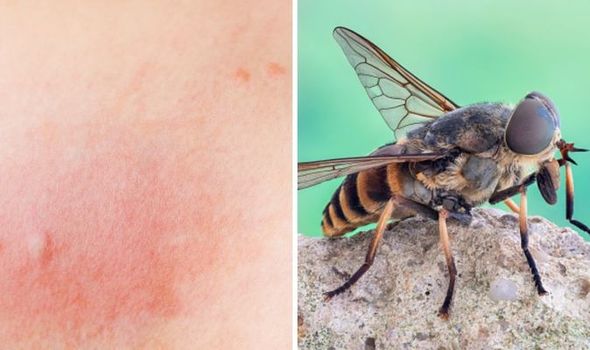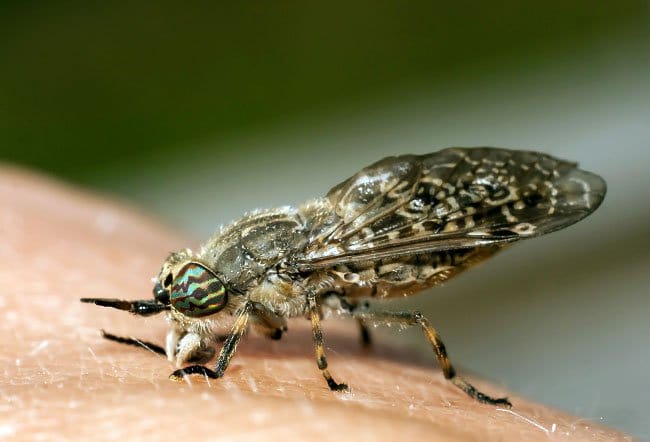Table of Contents
Horse Fly Bite – Know What To Do!
There are chances you have had a horsefly bite more than once by now. In some regions, horse flies cannot be avoided. They are equally more prevalent during the summer seasons.
If you are not yet familiar with these pesky insects, they are large and dark-colored flies. They are active mostly during the daytime, particularly in the summer months. You can recognize a horse fly by its size. These files are about an inch long making them larger than average flies.
They can also be distinguished by their different color. The upper part of these flies is white in color, typically marked by vertical black colored lines. Their lower part is solid black.
They are found throughout the North American region and are highly concentrated in humid and hot states like Florida.
Horse Fly Bite

Horseflies are more likely to bite large mammals such as dogs, humans, and horses. They are attracted mostly to dark and moving objects. Not only are objects, but they are attracted to carbon dioxide also. This might be a reason why they are more prevalent in the summer season when the atmosphere is sweaty.
If you have ever been followed by a horsefly and it seemed more like a vengeance, you might be having the right assumption. Pest world has examples that a female horse fly particularly is highly persistent. They are known to chase their victims for a short time if the horsefly bite does not get them a satisfying meal they had wanted.
What does a horsefly bite feel like?
If you have been bitten by a horse fly earlier, you know that a horsefly bite hurts. The mandible of a fly makes the bite more painful. The mandible is the fly’s jaw and it is shaped similar to scissors and cuts right into your skin when it bites causing pain.
Their mandible also has small hooks to help the horse fly lock their teeth in to feel better. Once the horse flies lock-in, it sucks or eats the blood from your skin. Horsefly bite may cause a sharp burning sensation and also it causes inflammation, itchiness, and swelling around the horsefly bite region. Sometimes you might also develop a bruise.
Now that you know what a horsefly bite feels like, let’s find out if it is dangerous.
Is Horse Fly Bite dangerous?
Besides just momentary pain, horse fly bite is not much harmful to humans. But these bites can be really dangerous for horses. This is because horse fly bite carries equine infectious anemia which is also called swamp fever. When the horsefly bites an equine animal, it usually transmits a life-threatening disease.
If a horse gets a horsefly bite, they experience fever, general illness, and hemorrhaging. Some horses do not show any symptoms but they carry the infection and might pass it to other equine animals.
Allergic reactions
The saliva of horse fly in your skin may cause bruises, inflammation, and itchiness around the site. In rare cases, a horsefly may also cause allergic reactions including:
- Abdominal pain and vomiting.
- Chest pain.
- Difficulty in breathing.
- Difficulty in swallowing.
- Swelling of face and mouth
- Lightheadedness and fainting.
- Skin flushing and rashes
What to do after a horsefly bite
You must always cleanse a bite and then apply an over-the-counter ointment or an antiseptic spray to keep the wound clean and decide the risk of further infection. It also helps decrease the itchiness and irritation. In most cases, the horsefly bite usually heals on its own without applying ointment.
Make sure you watch the area to detect signs of an infection such as foul odor and excessive pus accumulation. If you notice any unusual symptoms, you must consult a doctor and mention everything to get treatment.
Certain insect bites are more dangerous and can cause severe infection, if you feel breathing difficulties, worsening of pain, or you see the rash spread, you should seek a doctor’s help and energy treatment.
To treat the horsefly bite, you can do the following:
- Cleanse the region of the bite.
- Apply over-the-counter ointment and spray to clean the wounds.
- Take an antihistamine to reduce itchiness if needed.
Check out for infection signs like foul odor, swelling, excessive pus, increasing redness, and other unusual symptoms.
How to prevent horse fly bite
To help prevent future horse fly bites, make sure you apply an insect repellant before heading outdoors. If possible, wear light-colored clothes to avoid house fly bites. Know that horseflies are more attracted towards dark color shades, so this will help keep them at distance from you.
Here are steps to follow:
- Avoid places where horse flies are most active.
- Cover your exposed skin by wearing light-colored clothes, hats, and long-sleeved clothes.
- Install door screens and windows
- Use insect repellants effective against horse flies and follow the manuals. The most effective horse fly repellents have 50% DEET.
- Clear out piles of rubbish and decaying straw, hay, and other vegetation that may attract the horse to fly to your house.
- Avoid walking in the long grass.
- Avoid wearing perfumed cosmetic products that may attract horseflies.
Some More Information On Horse Flies

Adults’ horse flies are strong and fast fliers. They are capable of flying more than 30 miles. They do not spread widely even though they fly more and cover so much distance. They wait in wooded areas and wait for hosts to come and then bite them.
They are also attracted to light and sometimes you might see them congregate at your windows. Horseflies are typically first and woodland dwellers.
The Bottom Line
If you have been bitten by a horsefly, the bite is likely to heal in few days and you will not experience adverse effects. But if the bite has not healed on its own after few days or exercising adviser effects like dizziness and worsening of pain, you should consult the doctor. They will be able to excess the bite and determine what to do next to treat the bite.
This was all you needed to know on horse fly bite. If you have a problem with bed bugs, you can follow these remedies to get rid of bed bugs efficiently.


